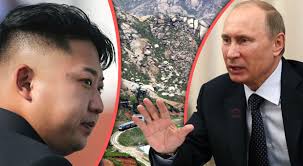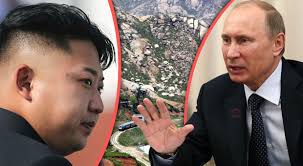
Echoing China’s resistance to more punitive measures to pressure Pyongyang into abandoning its atomic and missile programs, after its sixth and most powerful nuclear test, Russian President Vladimir Putin again rejected U.S. calls for new sanctions against North Korea.
The Russian leader instead urged the international community to offer security guarantees to North Korea and criticized the sanctions as “useless and ineffective.”
“They’ll eat grass, but they won’t abandon their program unless they feel secure,” he told reporters Tuesday at an emerging markets summit in Xiamen, China, which was hosted by his Chinese counterpart Xi Jinping.
The Trump administration would seek the strongest possible sanctions against Kim Jong Un’s regime, said U.S. Ambassador to the United Nations, Nikki Haley, on Monday. She said after a meeting of the UN Security Council that Kim was “begging for war” after testing what he claimed was a hydrogen bomb.
Haley said the U.S. wants the Security Council to vote on them Sept. 11 and would circulate new draft sanctions.
And with Deputy Prime Minister Taro Aso on Tuesday calling for additional measures, Japan is singing the same tune as the U.S. "There’s no chance of talks progressing without increasing pressure," he told reporters in Tokyo.
The standoff between North Korea and the U.S. has become the most dangerous foreign crisis facing President Donald Trump, as the isolated Communist state accelerates its program to develop weapons of mass destruction.
Putin said that a “global catastrophe and a huge number” of human casualties could be the result of what he described as a policy of whipping up war hysteria. “There’s no other path except for a peaceful, diplomatic resolution of the North Korean nuclear problem,” he said.
Japan was calling for moves to cut off its oil supply even before North Korea detonated its most powerful nuclear bomb on Sunday. Later, warnings of halting all trade with any country that does business with Kim Jong Un’s regime was issued by Trump. The warning was called as “unacceptable” by China, which supplies most of its food and fuel to North Korea.
A question on whether his nation would consider limiting oil shipments to North Korea were battered off by the Chinese Foreign Ministry spokesman Geng Shuang at a briefing in Beijing.
“The actions and reactions of the Security Council will depend on the conclusions reached through debate by its members,” Geng said, according to an official transcript. “China will promote denuclearization and the maintenance of stability on the peninsula, and promote solving problems on the peninsula through dialogue and consultation.”
Fearing a destabilizing economic blow and the possibility of the U.S. military gaining influence on its border via a unified Korea, Beijing has avoided prodding North Korea to the point it might collapse since the Korean War. And even while China’s interests have diverged from those of North Korea, that calculation has held.
Her Chinese counterpart Wang Yi told her that Beijing is open to additional sanctions, South Korean Foreign Minister Kang Kyung-hwa said Tuesday South Korean Foreign Minister Kang Kyung-hwa however said on Tuesday. Her nation is working with the U.S. for the "strongest" measures against North Korea, Kang told parliament.
(Source:www.cnbc.com)
The Russian leader instead urged the international community to offer security guarantees to North Korea and criticized the sanctions as “useless and ineffective.”
“They’ll eat grass, but they won’t abandon their program unless they feel secure,” he told reporters Tuesday at an emerging markets summit in Xiamen, China, which was hosted by his Chinese counterpart Xi Jinping.
The Trump administration would seek the strongest possible sanctions against Kim Jong Un’s regime, said U.S. Ambassador to the United Nations, Nikki Haley, on Monday. She said after a meeting of the UN Security Council that Kim was “begging for war” after testing what he claimed was a hydrogen bomb.
Haley said the U.S. wants the Security Council to vote on them Sept. 11 and would circulate new draft sanctions.
And with Deputy Prime Minister Taro Aso on Tuesday calling for additional measures, Japan is singing the same tune as the U.S. "There’s no chance of talks progressing without increasing pressure," he told reporters in Tokyo.
The standoff between North Korea and the U.S. has become the most dangerous foreign crisis facing President Donald Trump, as the isolated Communist state accelerates its program to develop weapons of mass destruction.
Putin said that a “global catastrophe and a huge number” of human casualties could be the result of what he described as a policy of whipping up war hysteria. “There’s no other path except for a peaceful, diplomatic resolution of the North Korean nuclear problem,” he said.
Japan was calling for moves to cut off its oil supply even before North Korea detonated its most powerful nuclear bomb on Sunday. Later, warnings of halting all trade with any country that does business with Kim Jong Un’s regime was issued by Trump. The warning was called as “unacceptable” by China, which supplies most of its food and fuel to North Korea.
A question on whether his nation would consider limiting oil shipments to North Korea were battered off by the Chinese Foreign Ministry spokesman Geng Shuang at a briefing in Beijing.
“The actions and reactions of the Security Council will depend on the conclusions reached through debate by its members,” Geng said, according to an official transcript. “China will promote denuclearization and the maintenance of stability on the peninsula, and promote solving problems on the peninsula through dialogue and consultation.”
Fearing a destabilizing economic blow and the possibility of the U.S. military gaining influence on its border via a unified Korea, Beijing has avoided prodding North Korea to the point it might collapse since the Korean War. And even while China’s interests have diverged from those of North Korea, that calculation has held.
Her Chinese counterpart Wang Yi told her that Beijing is open to additional sanctions, South Korean Foreign Minister Kang Kyung-hwa said Tuesday South Korean Foreign Minister Kang Kyung-hwa however said on Tuesday. Her nation is working with the U.S. for the "strongest" measures against North Korea, Kang told parliament.
(Source:www.cnbc.com)














